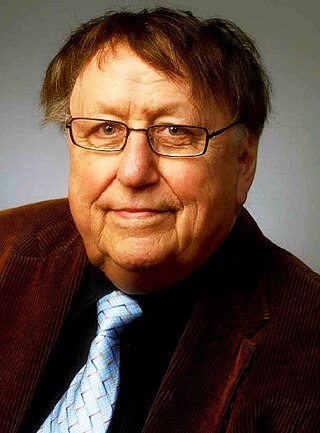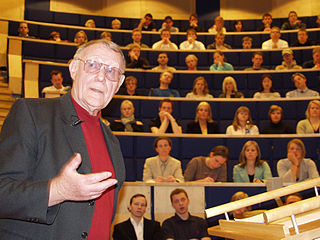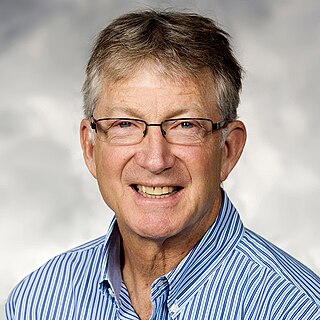Related Research Articles

Lund University is a public research university in Sweden and one of Northern Europe's oldest universities. The university is located in the city of Lund in the Swedish province of Scania. It traces its roots back to 1425, when a Franciscan studium generale was founded in Lund. After Sweden won Scania from Denmark in the 1658 Treaty of Roskilde, the university was officially founded in 1666 on the location of the old studium generale next to Lund Cathedral.

Umeå University is a public research university located in Umeå, in the mid-northern region of Sweden. The university was founded in 1965 and is the fifth oldest within Sweden's present borders.

Uppsala University (UU) is a public research university in Uppsala, Sweden. Founded in 1477, it is the oldest university in Sweden and the Nordic countries still in operation.

Raymond Urgel Lemieux, CC, AOE, FRS was a Canadian organic chemist, who pioneered many discoveries in the field of chemistry, his first and most famous being the synthesis of sucrose. His contributions include the discovery of the anomeric effect and the development of general methodologies for the synthesis of saccharides still employed in the area of carbohydrate chemistry. He was a fellow of the Royal Society of Canada and the Royal Society (England), and a recipient of the prestigious Albert Einstein World Award of Science and Wolf Prize in Chemistry.

The University of Moratuwa is a public university in Sri Lanka. It is located on the bank of the Bolgoda Lake in Katubedda, Moratuwa, a suburb of Sri Lanka's capital Colombo.
The Faculty of Science at the University of Melbourne is one of the largest in Australia, with over 10,000 undergraduate and postgraduate students and a significant interdisciplinary research agenda.

Anders Hallberg is a Swedish pharmaceutical researcher, professor in medicinal chemistry and 2006–2011 Rector Magnificus and Vice Chancellor at Uppsala University.

Babol Noshirvani University of Technology (BNUT), sometimes also referred to as Noshirvani Institute of Technology or NIT, is a public research university and Institute of Technology in Babol, Mazandaran province in the north of Iran, 20 km (12 mi) south of the Caspian Sea. The university is an influential center for academic research in Iran, due to which it has been consistently ranked among the top schools in the country. BNUT is currently ranked 1st among all Iranian universities according to Times Higher Education (THE) World University Rankings. THE has also ranked BNUT between 351st and 400th among world universities, 55th among the world's young universities, as well as 43rd among Asian universities.
Edward I. Solomon is the Monroe E. Spaght Professor of Chemistry at Stanford University. He is an elected member of the United States National Academy of Sciences, a Fellow of the American Association for the Advancement of Science, and a Fellow of the American Academy of Arts and Sciences. He has been profiled in the Proceedings of the National Academy of Sciences. He has been a longtime collaborator with many scientists, including his colleague at Stanford University Keith Hodgson for the study of metalloenzyme active sites by x-ray spectroscopy, along with the synthetic chemists Richard H. Holm, Stephen J. Lippard, Lawrence Que Jr. and Kenneth D. Karlin.

Klaus Hermann Mosbach was a Swedish applied biochemist based at Lund University. He founded the Center for Molecular Imprinting in Lund, Sweden and was co-founder of the Institute of biotechnology at ETH Zurich Switzerland 1982. He was a great visionary who gave shape to the modern era of Molecular imprinting for which he was awarded the plaque at the international meeting of molecular imprinting in 2010 in New Orleans, United States.
Eva Barbro Helen Åkesson is a Swedish professor of chemical physics who was the Rector of Uppsala University 2012–2020. She was previously Pro-Rector of Lund University.

Linnaeus University (LNU) (Swedish: Linnéuniversitetet) is a state university in the Swedish historical province (landskap) Småland, with campuses located in Växjö and Kalmar. Linnaeus University was established in 2010 by a merger of former Växjö University and Kalmar University (Högskolan i Kalmar), and is named in honour of the Swedish botanist Carl Linnaeus.
Christopher Alexander Hunter, FRS is a British chemist and academic. Since 2014, he has been Herchel Smith Professor of Organic Chemistry in the Department of Chemistry at the University of Cambridge. His research is currently focused on molecular recognition. He was previously a lecturer at the University of Otago and a lecturer then professor at the University of Sheffield.
Shitij Kapur is a medical doctor and administrator. He is has served as the 21st president and principal of King's College London since 1 June 2021. Previously, he was the dean of the Faculty of Medicine Dentistry and Health Sciences and assistant vice-chancellor (health) of the University of Melbourne from 2016 to 2020.

Ganapati Dadasaheb Yadav is an Indian chemical engineer, inventor and academic, known for his research on nanomaterials, gas absorption with chemical reaction and phase transfer catalysis. He served as the vice chancellor of the Institute of Chemical Technology, Mumbai from 2009 until November 2019. He is currently the Emeritus Professor of Eminence at ICT Mumbai.

Peter Aronsson is the Vice-Chancellor of Linnaeus University since 2017. He is a Swedish historian specializing in early-modern political culture and public history.

Kristina Edström is a Swedish Professor of Inorganic Chemistry at Uppsala University. She also serves as Head of the Ångström Advanced Battery Centre (ÅABC) and has previously been both Vice Dean for Research at the Faculty of Science and Technology and Chair of the STandUp for Energy research programme.

James L. Skinner is an American theoretical chemist. He is the Joseph O. and Elizabeth S. Hirschfelder Professor Emeritus at the University Wisconsin-Madison. Until 2024 he was a member of the Scientific Advisory Board of the Welch Foundation. Until 2020, Skinner was the Crown Family Professor of Molecular Engineering, professor of chemistry, director of the Water Research Initiative and deputy dean for faculty affairs of the Pritzker School of Molecular Engineering at the University of Chicago. Skinner is recognized for his contributions to the fields of theoretical chemistry, nonequilibrium statistical mechanics, linear and nonlinear spectroscopy of liquids, amorphous and crystalline solids, surfaces, proteins, and supercritical fluids. Skinner is the co-author of over 230 peer-reviewed research articles.
Jan Cornelis Maria van Hest is a Dutch scientist of organic chemistry, best known for his research regarding polymersomes and nanoreactors. He currently holds the position of professor of bioorganic chemistry at Eindhoven University of Technology and is scientific director at the Institute of Complex Molecular Systems. Among the awards he has received, he was one of the recipients of the 2020 Spinoza Prize.
References
- ↑ "Ian Nicholls" . Retrieved 8 January 2020.
- ↑ "Ian Nicholls - Linnaeus University, Sweden - Lnu.se". lnu.se. Archived from the original on 30 April 2018. Retrieved 6 July 2015.
- ↑ "Ian A Nicholls". uu.se. Archived from the original on 7 July 2015. Retrieved 6 July 2015.
- ↑ "Bioorganic and Biophysical Chemistry Laboratory - Linnaeus University, Sweden - Lnu.se". lnu.se. Archived from the original on 23 October 2014. Retrieved 6 July 2015.
- ↑ Karlsson BC, Rosengren AM, Andersson PO, Nicholls IA (September 2007). "The spectrophysics of warfarin: implications for protein binding". J Phys Chem B 111 (35): 10520–8. doi:10.1021/jp072505i [ permanent dead link ]. PMID 17691835.
- ↑ "IJMS". mdpi.com.